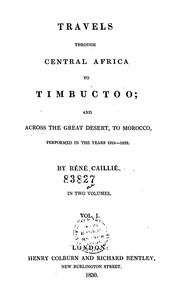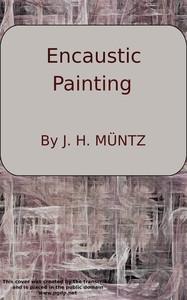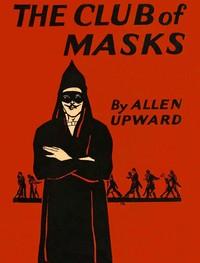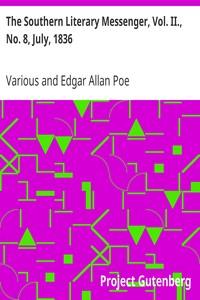|
|
Read this ebook for free! No credit card needed, absolutely nothing to pay.Words: 105825 in 13 pages
This is an ebook sharing website. You can read the uploaded ebooks for free here. No credit cards needed, nothing to pay. If you want to own a digital copy of the ebook, or want to read offline with your favorite ebook-reader, then you can choose to buy and download the ebook.

: Travels through Central Africa to Timbuctoo and across the Great Desert to Morocco performed in the year 1824-1828 in Two Volumes Vol. I by Cailli Ren - Sudan (Region) Description and travel; Sahara Description and travel@FreeBooksThu 08 Jun, 2023 as. On leaving them we found ourselves in a valley formed of two hills of granite. The soil, which consists of grey sand, is fertile and covered with good pasturage. We were obliged once more to cross the Doulinca, and, about one in the afternoon, we halted among some Foulah herdsmen. Their huts were built beneath the shade of large trees, a most enviable situation in this part of the world. Since my departure from Kakondy, I had not seen so beautiful and fertile a tract of country. Instead of rocks, I now beheld on every side delightful plains, which required only the labour of the husbandman to produce every thing necessary for human life. The day had been excessively hot, and about two in the afternoon we heard thunder in the direction of N. E. The sky was overcast with black clouds, and the rain fell abundantly. We repaired for shelter to the huts of the herdsmen, who at first scrupled to admit us. The thunder rolled in terrific peals; and I expected every moment that we should be struck by the lightning. The flashes rapidly succeeded each other, and the sky appeared to be one sheet of flame. We lay down on the herdsmen's beds, consisting of round pieces of wood placed upon posts which raised them a little from the ground, and we patiently awaited the termination of the storm. When the rain ceased, we left the huts, and the freshness which now pervaded the atmosphere added new charms to the surrounding scene. We ate a little rice, and then proceeded eastward. We crossed a little rivulet which flowed over a bed of granite. The road was wet and muddy, which rendered our journey fatiguing. After travelling half a mile to N. E. and another half mile to the east, we arrived at night-fall at an ourond?, or slave village, called Lant?gu?. We were again overtaken by rain on the road, and I had recourse to my umbrella which, however, did not entirely protect me. The chief of Lant?gu? gave us a hut. Before it there was a beautiful orange-tree, beneath which I sat down on a sheep-skin. Thunder was again heard. The sky was covered with clouds, the atmosphere warm and damp, and it continued raining the whole of the night. The incessant flashes of lightning continually illuminated our hut, the door of which would not more than half shut. We stopped at Lant?gu? the whole of the 26th, for one of the slaves of our caravan, who was heavily laden, had bad feet. I spent a part of the day in visiting the village and its inhabitants, who were about one hundred and fifty in number. Many of them thought me too white for a Moor. I observed round the huts some fine bananas, pineapples, cassavas, yams, and various other useful plants. They were well cultivated. It is the women's business to attend to them. The men labour in the rice fields, &c. The heat was very great during the day, which denoted a storm in the evening. We were now approaching the rainy season which in these mountainous districts commences in April, and continues six consecutive months. In the course of the day a little dispute arose between my guide Ibrahim and two Mandingoes of his village, who insisted on having their share of the value of a bullock, which had been given to them by M. Castagnet, at Kakondy. The two Mandingoes came to me, and wished me to decide their difference. However, my decision only made the matter worse, and so irritated my guide, that he threatened to leave me, which would, of course, have thrown me into no little embarrassment. At length, a young negro, who had been to Sierra-Leone and spoke a little English, came to my aid. He helped to interpret what I said, and thus peace was restored among us. The merchants spent the remainder of the day in examining their goods and I amused myself in looking about the neighbourhood of the village. I saw several furnaces for smelting iron, a metal which is found in great abundance among the mountains. These furnaces, which are from five to ten feet high, and eighteen or twenty feet in circumference, have a chimney at top, and four holes at the base, in the direction of east, west, north and south. At a little distance from the village, there are some small streams, which descend from the mountains and run rapidly over beds of granite. Here I took the opportunity of bathing, and some of the Mandingoes washed their clothes. Pandeya is situated at the foot of a mountain, and contains from one hundred and fifty to two hundred inhabitants. They all came to see me, and each brought me a little present of milk. After we had reposed for a short time in the shade of some large n?d?s, and refreshed ourselves with the milk, for which we were indebted to the generosity of the Foulahs, my guide Ibrahim and his comrades proposed to buy a bullock, to celebrate the festival of the Ramadan, which happened on the following day. He asked me, through the medium of the young Foulah, who spoke English, whether I would pay my share of the price. This I declined doing, alleging that I had a long journey to perform with very scanty resources; and Ibrahim said no more on the subject. They purchased the bullock for four bars of tobacco; about the value of two gourdes, the joint contribution of about twelve or fifteen of our party, including the travelling Foulahs. On the 28th of April, which was the grand festival day, we staid at Pandeya, and about eight in the morning the merchants all ranged themselves in a line to repeat the prayer. I took care to be among them and even affected greater devotion than any of the rest. The prayer being ended, the bullock was killed. The Mandingoes spent nearly an hour in equalizing the lots of meat. They each took a little bit of wood to serve as a measure, and after mingling them all together, the lots were distributed. Some of the meat was dried and smoked, that it might keep for the journey; but a considerable portion was immediately boiled with rice for the festival. I received numerous visits from Foulahs, who brought me their usual presents of milk and rice, which were all they had to give. The festival was celebrated with considerable gaiety. The Mandingoes, in particular, indulged in tumultuous manifestations of joy. They fired several discharges of musketry, and afterwards all the negroes assembled round my guide's hut and sang songs in his praise. He was, as I have already mentioned, the chief of the caravan; and it was he who furnished the gunpowder for the rejoicings. These people have a bad habit of putting too great a charge of powder into their muskets, and on this occasion one of them burst in the hands of a negro; but fortunately, the poor fellow was not hurt. About eleven in the forenoon Ibrahim, accompanied by the two Mandingoes who were engaged in the dispute to which I have already alluded, came to invite me to partake of their dinner, and they again requested me to forget what had passed. I accepted the invitation. On entering Ibrahim's hut, I saw a large calabash full of boiled rice, upon which was laid a considerable quantity of the beef. We sat down and each helped himself with his hands, according to the negro custom. When the rice was finished, Ibrahim distributed the meat. I observed that the Mandingoes ate an unusual quantity that day. Eating, indeed, seems be the highest pleasure they are capable of enjoying. During the rest of the day they were very merry, and they exchanged the bullock's hide for some rice, which we ate during our journey. On the 29th of April, the remainder of the meat which had been smoked all night was put into leather bags, and we resumed our journey at six in the morning. Opposite to the village, about half a mile to the north, there was a small chain of mountains, with level summits; and at each extremity of the chain one rises to a considerable height above the rest, like the turret of an ancient castle. These mountains have no vegetation. We proceeded for a mile eastward, upon rocks level with the surface of the ground, of a reddish colour and porous nature, and we next ascended a mountain composed of blocks of beautiful black granite, among which grew various large trees particularly the n?d?, which abounds throughout all this part of the country. The road was very bad; we had to walk upon black calcined stones, which had the appearance of being of volcanic origin. After crossing several little streams that flow over beds of rock, we came to a mountain about five or six hundred ordinary paces high. It is called by the natives Touma, and it separates the country of Irnank? from the Fouta-Dhialon. We rested for a short time on its summit. My companions assured me that the road thence to Cambaya, my guide's village, would be better than the preceding part of our journey. I observed in this neighbourhood some very fine indigo, and some bombaces which rivalled in size the enormous baobabs on the banks of the Senegal. The country of Irnank? lies to the west of the Fouta, and to the east of Kakondy. It has on the north the negroes who inhabit the neighbourhood of Casamance; and on the south the Timannee negroes, who occupy a tract of country not far from Sierra-Leone. Irnank? is studded with lofty mountains, and inhabited by pastoral Foulahs. They possess fine flocks, which are their principal wealth. The complexion of these Foulahs is a lightish chesnut colour; they have good countenances, high foreheads, aquiline noses, and thin lips, and their heads are somewhat of an oval shape. The only point in which they resemble the Mandingoes is their curly hair. They hold themselves very upright, and walk with an air of dignity; for they think themselves far superior to the other negro tribes. Their dress, like that of the Mandingoes, is exceedingly simple; it consists of a coussabe, or shirt, of white cloth, of their own manufacture, and a pair of trowsers. The trowsers are made of coarse cloth; they are very wide, and confined round the waist by means of a buckle; they reach about half-way down the leg, where they are left loose. A cap of the same material completes the costume. When these negroes travel, they are armed with bows and poisoned arrows, and they also carry lances. They rub their bodies all over with butter, and they put a great deal upon their heads, which occasions a very disagreeable smell. The women take remarkable pains in dressing their heads. They plait their hair and adorn it with various glass trinkets. They wear amber necklaces, and their whole appearance is animated and pleasing. In these mountains there are many Dhialonk?s, the ancient possessors of the country of Fouta-Dhialon, which was conquered long ago by the Foulahs, who compelled part of the population to embrace Mahometanism. Those who refused to forsake idolatry became tributaries to the almamy, or chief, of Irnank?. They pay their tribute in cattle. These people are very mild and hospitable to the strangers who are continually travelling through their mountainous country. They have a particular dialect, which the Foulahs do not understand. After resting for a short time, we continued our journey eastward. The road was interspersed with small masses of rock, which incommoded me exceedingly; for, as I could not walk with the sandals of the country, I was obliged to go barefoot. We passed Courgin, a little village containing a population of about one hundred and fifty or two hundred. The masses of rock were succeeded by stones, apparently volcanic. Proceeding nine miles further, to the east, we arrived at three in the afternoon at Comi-Sourignan, a pretty village, situated on a hill, and containing about one hundred and fifty inhabitants. The aspect of the surrounding country was beautiful; it was interspersed with fine hills, covered with brilliant verdure. The soil, which is of a yellow colour, is very productive. The village, enclosed by a quick-set hedge, is very clean. The huts are surrounded by gardens, containing plantations of pistachio-nuts, cassavas, caribbee cabbages, and other things. These gardens, which are cultivated by women and children, are kept in very good order, and the little paths leading to the huts are cleanly swept. The chief, in whose presence we said the prayer, invited Ibrahim and me to his hut, where he made us partake of his dinner, consisting of boiled rice with a little sour milk. We seated ourselves on a mat, near a little fire; for fires are always kept burning here, on account of the humidity of the climate. When our repast was ended, the wife of the chief came and sat down beside us. She listened in silence to our conversation: we were speaking of the christians, who are always objects of contempt among these people. The wife of the chief kindly asked me to take a little milk, and then she went to gather some figs and bananas, and put them into a clean calabash, which she gave to me and my guide. This woman had a pleasing countenance, and her dress, which was very clean, consisted of two breadths of cotton cloth of the manufacture of the country. She had not the offensive smell of the women of the roving Foulahs of Irnank?. The hut was large and in good order; the floor was adorned with handsome designs, made of earth. We passed the night in this pretty village. At half-past five, on the morning of the 30th of April, we took leave of our kind hosts, and proceeded to the S. E., crossing an extensive plain, apparently susceptible of high cultivation. In descending, we turned an elevated plain, situated in the province of Timbi. The plain in this part is covered with red rocks, level with the ground; the country is, generally, very open. We saw several hillocks within the distance of seven or eight miles round us. We met a Bondou negro, who said that he had come from Bouliban?, the capital of the country, and was going on a trading expedition to Kakondy; he had nothing with him but gold. I was very much astonished that this man should undertake so long and difficult a journey on foot, when he was within reach of our establishments at Bakel, which are provided with all sorts of merchandise. We proceeded eastward, crossing a pretty valley, situated between two hills, and containing three villages; the largest is Telewel: its population is, at most, five hundred. I was overtaken by a Foulah, accompanied by one of his wives, carrying on her head a calabash full of milk, which he begged me to accept. Ibrahim, my guide, having stopped for a short time, had informed this Foulah that I was an Arab from the neighbourhood of Mecca, and related to him my adventure at Alexandria. The zealous disciple of the prophet thought that he was performing a meritorious action in the eye of God by giving me a little milk. When he left us he extended his hand to me, and wished me a speedy return to my country. The road now became somewhat more stony, and we halted for a short time beneath the shade of some trees to wait for our companions. Several women brought us bananas and figs, fourteen of which I purchased for three glass beads. Free books android app tbrJar TBR JAR Read Free books online gutenberg More posts by @FreeBooks
: Encaustic: Or Count Caylus's method of painting in the manner of the ancients. To which is added a sure and easy method for fixing of crayons by M Ntz Jean Henri Caylus Anne Claude Philippe Comte De Other - Encaustic painting@FreeBooksThu 08 Jun, 2023

: The club of masks by Upward Allen - Detective and mystery stories; Murder Investigation Fiction; Nightclubs Fiction@FreeBooksThu 08 Jun, 2023
|
Terms of Use Stock Market News! © gutenberg.org.in2025 All Rights reserved.






